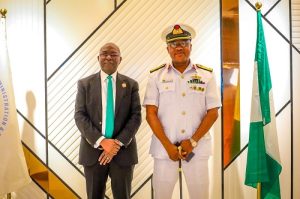Ports Process Manual: Shippers’ Council Moves to End Corruption Involved in Indiscriminate Boarding of Vessels

 *Records arrests , bribe money seized
*Records arrests , bribe money seized *Commends NPA, customs for providing necessary machinery, cooperation
By Francis Ugwoke
The implementation of the Nigerian Ports Process Manual (NPPM) has recorded some progress with the decision to stop indiscriminate boarding of vessels calling at the nation’s ports by security agencies.
Under the NPPM, only officially designated agencies are allowed to board vessels at the ports jointly as against the practice in the past.
Before now, some agencies chose to board vessels at their own time and schedule in what was described as indiscriminate and time consuming for the ships.
The Executive Secretary, Nigerian Shippers Council (NSC), Mr Hassan Bello, said his Council which is the lead agency overseeing the implementation of the process in collaboration with others has introduced joint boarding of vessels by security agencies to save the time of the vessels.
Bello in an exclusive chat with SHIPPING DAY also disclosed that the number of the agencies has been reduced to achieve the same purpose of trade facilitation, adding that only specified agencies now board the vessels.
On joint boarding of vessels, he explained some of the specified agencies who are by law empowered to board vessels separately have cooperated to do so for the purpose of saving time of the vessels.
He also said that the team of security agencies boarding the vessels try to conclude their inspection in the vessel within 30 minutes of boarding in what he explained was also to save time.
He said, “We are taking one issue at a time eventhough it is wholistic, take for example of boarding of vessels. Boarding of vessels should be done by specified agencies. So we have stopped some agencies from boarding vessels. There should be joint boarding. Before now agencies board at separate time. But we have been able to get them to board the vessel jointly. Then the time allocated, it will not be more than 30 minutes we are out of the ship because delay is dangerous”.
He also disclosed that the implementation of the NPPM by the agencies in the ports has led to arrests of some individuals who demanded bribe from the ships, adding that the bribe proceed (money) has been seized while investigation on the matter continues.
“The issue is do it as it is based on international acceptability. Do it on time so that our ports will be efficient. So it is about efficiency of the ports, reduction of corruption . We have made arrests involving people who go into vessels and demand bribe. We are investigating the issue. We have seized some money and this will be an example to everybody that things have changed now. This is to send signals that it is not business as usual. What we want is validation from stakeholders internationally to know something is happening in Nigeria”, Bello said.
Among the specified agencies empowered to board vessels on arriving at the ports for inspection include the Port Health officials who board first separately to check the health status of crew on board, Nigeria Customs, Nigeria Immigration and NDLEA.
He explained, “they will go jointly. We assemble at 8.30am and go by 9am – 9.30 am we are out of the place because of delay. Then, we monitor that nobody should demand bribe or anything because there are the unhidden charges that make Nigerian shipping very costly, even the freight”.
Bello described the assignment of the port process manual as fascinating experience, adding that it was not new as it is what the ports economic regulator has been doing.
He also explained that the national assignment has been made easy for the ports economic regulator with the Standard Operating Procedures (SOPs) It had developed and introduced in the past.
According to him, with the SOPs developed , the Council simply monitors, supervises sand coordinates the process at the ports.
He said what is needed is stakeholders’ support, stressing that his Council has received a lot of support from the stakeholders, including the Nigerian Ports Authority (NPA), terminal operators, shipping companies, among others, describing such support as exemplary,
For instance, the NPA, he said, has seconded some senior officials who have helped the Council tremendously in its assignment.
He told SHIPPING DAY, “It has been very fascinating experience. We need a lot of stakeholders support. But what we have been doing is not new. We have developed the Standard Operating Procedures (SOPs) for all the stakeholders in the port. That is the issue of ‘when, where, why, how’ of things to be done at the port. So, we are just supervising and reporting. Many stakeholders abide with their SOPs. Contrary to what people think, we are not doing the operating procedures ourselves, we are monitoring . The SOPs have already been set, we need to monitor, supervise and coordinate and so far it has been quite challenging but very good. We have had tremendous support from stakeholders. First of all, the Nigerian Ports Authority (NPA) has seconded two senior staff to work with us. They have been quite cooperating. We also have within the NPA the Harbours Masters, some pilots and Port Managers. We have had meetings with them and they have been very very supportive. The terminals, shipping companies and many operators have been exemplary.
“We have had discussions with the National Drag Law Enforcement Agency, Nigeria Customs Service, National Agency for Food and Drug Administration Control and many others who have one thing or the other to do at the ports. The issue is do it as it is based on international acceptability. Do it on time so that our ports will be efficient. So it is about efficiency of the ports, reduction of corruption”
“ What we are waiting for now is continued coordination of this and again we are grateful to Nigerian Ports Authority for providing the necessary machinery so that we have joint boarding . We are also grateful to the Nigeria Customs for cooperating with us because Customs in their law, they could go and board the vessel separately, but they have in the spirit of cooperation agreed to do it jointly. We have Port Health also working with us and some agencies”.
Bello described the changes brought by the implementtion of the port process manual as palpable.
He explained, “You know what changes we want is before masters or owners of the ship or charterers are apprehensive because of serious demands, serious delays. If we conquer that, that means the cost of shipping will be reduced. Secondly, the turnaround time for ships will be reduced because we will not delay any ship from coming. There are SOPs that is what we want so that Nigerian ports will be in competition with other ports in the world’.
The NSC was in December last year appointed by the federal government as the lead agency for the implementation of the NPPM.
With the appointment, the Council is saddled with the task of overseeing ports operations on daily basis.
Vice President, Prof Yemi Osinbajo while launching the NPPM in December said implementation of the NPPM will improve the anti-corruption ranking of the country before the international community.
Osinbajo said that apart from achieving efficiency in pots operations, there was the need for an effective implementation of ideas that will change the perception and ranking of Nigeria in the Corruption Perception Index (CPI) of Transparency International.
He said that the process manual was aimed at addressing vulnerabilities in the port system, adding that it will create an enabling environment for port users.
He said, “An effective successful systemic intervention in the port sector will rapidly change the narrative, the perception and the ranking of Nigeria in the CPI. The Process Manual on Port Operations is expected to be one of the key indicators for the effective implementation of Executive Order 01 issued essentially to promote transparency and efficiency in the business environment, and designed to facilitate the ease of doing business.”
Osinbajo stated that the war against corruption was one of the priorities of the government, adding that since 2015 the administration has invested heavily to address the issues of corruption.
He described the process manual as very imperative, adding that it was “a step by step trajectory of processes at the ports”.
He added, “It outlines the actors and timelines for each process, it guides the user by highlighting all required documentation, payments, timelines, and the responsible agencies.
“It equally guides the port operator by detailing the implementation chain and provides clarity on the time required for each process. The Process Manual is expected to ensure predictability, promote transparency and accountability; reduce corruption in port processes; eliminate bureaucratic bottlenecks faced by port users and reduce the opportunity for illegal demands in the ports. It is expected that the Manual will be reviewed and updated as issues and developments emerge.”





